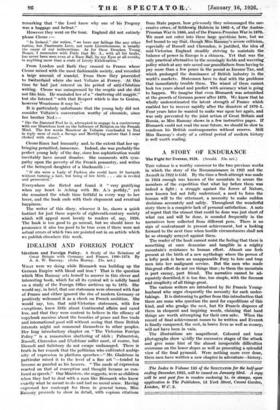. IDEALISM AND FOREIGN POLICY
Idealism and Foreign Policy. A Study of the Relations of Great Britain with Germany and France, 1860-1878. By A. A. W. Ramsay. (John Murray. 21s. net.)
WHAT were we &sing while Bismarck was -building up the -German Empire with blood and iron ? That is the question which Miss Ramsay sets herself to answer in this clever and interesting book, which for all its cynical wit is solidly baied on a study of the Foreign Office archives up to 1870. She would say, in brief, that our statesmen were Obsessed with fear of France, and either ignored the rise of modern Germany or positively welcomed it as a check on French ambition. She would say, too, that mid-Victorian statesmen, with few exceptions, knew little about Continental affairs and cared less, and that they were content to believe in the efficacy of 'copybook maxims about the beauties of peace and free trade and international good will without seeing that these British interests might not commend themselves to other peoples. Her- long introductory chapter on " The Victorian -Foreign Policy " is a remorseless shattering of idols ; Palmerston, Russell, Clarendon and Gladstone' suffer most, of course, but Disraeli and Salisbury do not escape inichhaged. " There is truth in her remark that the politician who cultivated ambig- uity of expression in platform speeches—" Mr. Gladstone in particular raised it to the level of a fine art "—tended to become as puzzled as his hearers. " The mode of expression reacted on that of conception and thought became as con- fused as speech." Our Ministers, she suggests, were as children when they had to deal with a man like Bismarck who knew; exactly what he meant to do and had no moral sense. Having expressed her contempt for- them in" general terms, Miss Ramsay proceeds to- shoW in detail, with copious citations from State papers, how grievously they mismanaged the sue- cessive crises, of Schleswig Holstein in 1863-4, of the Austro- Prussian War in 1866, and of the Franco-Prussian War in 1870.- We must not enter into -these large questions here, but we feel bound to say-that, ihouih Miss Ramsay's Severe criticism, especially, of Russell and Clarendon, is justified, the idea of , mid-Victorian England steadily striving to maintain the, balance of power in Europe is a chimera. Yet that was the onlypractical alternative to the seemingly feeble and wavering policy which at any rate saved our grandfathers from having to pay more than a few pence in the pound as Income Tax, and. which .prolonged the dominance of British industry in the; world's markets. Statesmen have to deal with the problems that immediately trouble them. The wisest of them cannot, look ten years ahead and predict with accuracy wind is going to :happen. We imagine that even Bismarck was astonished at the growth of German power after 1870. We know that he wholly underestimated the latent strength of France which enabled her to recover rapidly after the disasters of 1870-1. Four years later he wanted to make war upon her again, and was only prevented by the joint action of Great Britain and Russia, as Miss RamsaY shows in a few instructive pages. If Bismarck could not read the near future, we should be slow to condemn his British contemporaries without reserve. Still Miss Ramsay's study of a critical period of modern history is well worth reading.














































 Previous page
Previous page